Deprescribing Guide: Starting the Crucial Conversation
At BetterRX, we understand the intricate dynamics that exist between patients, their caregivers, and their medication regimens. A person's health and...

Former U.S President, Barack Obama proclaimed November as National Family Caregivers Month in 2014 to honor the 78 million unpaid Americans who, “play difficult and exhausting roles as they care for their loved ones while protecting their dignity and individuality.”
According to a 2016 National Institute of Aging report, 75% of family caregivers are women and many of them also work full-time and raise children of their own in addition to caregiving.
Although a profile exists, American caregivers are as diverse as their nation and encompass all walks of life across the age, gender, socioeconomic and race/ethnicity spectrum. Given this diversity, it can be hard to enact beneficial policies that address the needs of all caregivers.
In fact, preference for proposed caregiver policies often correlates with certain sociodemographic factors such as income.
Some believe that the growing number of family caregivers reflects rising healthcare costs as well as a growing elderly population. In 2020, the National Alliance for Caregiving and AARP will update their most recent report from 2015 with new data on the American caregiving experience. This report will break new ground by exploring the role of technology in caregiving as well as the relationship between neighbors and friends who provide unpaid care.
It is well-known that caregiving increases the risk of developing or exacerbating existing depression, anxiety and fatigue in family members. For a more personal perspective on caregiving and its challenges, we interviewed Heather. She is a former caregiver of her sister-in-law, Amy who died while on hospice after a decades long battle with cancer. Additionally, Heather currently provides care for an adult daughter who suffers from complex neuroimmune disease.
Given her caregiving experience in both hospice and healthcare, we asked her to compare the two different care settings. She explained that the main difference between them is time and intensity.
“In hospice, it’s concentrated intensity over a relatively short period of time. Hospice care is only initiated once a diagnosis becomes terminal. In healthcare, there are peaks and valleys over an indeterminate amount of time—sometimes an individual will need more care, other times less.
As scientific research progresses, there can be developments, which change the nature of care.” She listed cystic fibrosis as an example, which was initially thought to be a death sentence, but now future treatments loom on the horizon, which could make the disease much more manageable. “It’s cliched, but it’s the difference between a sprint and a marathon.”
She described how hospice staff are significantly more capable of supporting caregivers than mainstream healthcare providers because of their palliative care training. “Hospice is used to dealing with people at their most vulnerable. They are willing to talk about the really hard things. With chronic illness, the ambiguity is difficult for traditional healthcare providers to navigate, because its unfamiliar territory.”
In the face of serious illness and death, attention is duly placed on the individual directly affected, but Heather describes how caregivers become sympathetic sufferers as they also, “go through the process, but without the support or attention that a diagnosis provides.”
As a result, caregivers often experience medical trauma and PTSD. When Amy died, Heather experienced panic attacks. Something as innocuous as hearing a song on the radio or driving through certain intersections would bring up flashes of conversation with the palliative care doctor and her stomach would sour suddenly as she reflected upon Amy’s last month of life. “Part of what happens when uncomfortable or terrible things happen is you create a story to try and make sense of things that don’t make sense in order to shoulder the burden without it breaking you. Sometimes the narrative doesn’t stand up as you work through and acknowledge all the negative emotions.” These emotions included unresolved anger and bitterness over the experience.
One of the most harmful attitudes towards caregivers is idolization. “People want to hold you up as an example of selflessness, as a Mother Theresa, because we tend to get hung up on ‘inspiration porn,’ as a society. By idealizing caregivers, we ‘other’ or separate them.” Heather explained how the prospect of caregiving is daunting for many people, because it requires, “spending huge chunks of their life giving something away without compensation or review. You don’t get a Yelp review for being a good caregiver and your life doesn’t stop because of the responsibility.”
During Heather’s time caregiving Amy, many would remark on how extraordinary she was and wonder in amazement how the dying process didn’t bother her when secretly, it bothered her a lot--the smells, the mess, the dramatic emaciation. She interpreted their well-meaning praise as explanation for their lack of involvement, and instead of alleviating her spirits or making her feel “exceptional,” Heather just felt isolated. “You want to share the burden with someone else, but often when you ask for emotional or physical support, you’re told that they can’t and that’s hard to hear.” By the time of Amy’s funeral, while everyone was crying and holding hands, Heather just looked across at her sister-in-law, who also held Amy’s hand while she died, as if they had just survived a war. “We were too tried and beat down to be sad, and we felt guilty for not being sadder.”
She then offered this beautiful simile, “Caregiving is like holding up china to the light. To the naked eye, it may be invisible, but when you hold up bone fragile china to the light you see all the fault lines—in yourself and in other people.” Reevaluation is required, which forces reconciling your perception with reality. The process is often uncomfortable, and sometimes painful.
I asked Heather about what changes she would like to see in healthcare that would better support caregivers. Her suggestions were mostly procedural. For instance, she mentioned medical records becoming more accessible to caregivers when there is already a well-documented history of release of information privilege. She relayed an experience recently where she was forced to drive her daughter to the hospital for the express purpose of granting Heather permission to access new test results. Her daughter mostly ambulates by wheelchair, which can make transportation a timely endeavor and as a caregiver, the one thing you don’t have enough of is time. Another time-saving solution could be housing notaries in hospital or creating a database accessible to all healthcare systems that contains scanned legal documents relevant to a patient’s care.
Communicating with providers can also be difficult. Heather explained how sometimes she feels she must become hysterical in order to speak with a provider over an urgent matter because the boundaries are policed to such an extreme degree through middlemen (MAs, nurses, receptionists, residents). “They don’t need to hold my hand, but I do need access to information.” She mentioned how much easier her life would be if she could access a database containing recent studies on certain drugs and medical conditions that she could peruse herself. “Establishing clear communication rules and boundaries is important and explaining what circumstances warrant an emergency. Providers don’t want to waste their time, but most caregivers do not either. As frequent flyers, we do not want to spend any more time at the office then we have to.”
At BetterRx we challenge our clients to take note of the caregivers they encounter this month and seek out ways they can either alleviate or support a caregiver in this important, but often unsung work. When we help caregivers, we help patients. Caregivers are essential allies in our mission to provide exceptional patient comfort and should not be ignored.
Have questions? Get in touch with one of our specialists today!
About BetterRX
 BetterRX's mission is to radically change patient care by ending medication delays that cause needless suffering. BetterRX offers efficient ordering technology, medication tracking, real-time PPD & cost alerts, and committed local pharmacies. Learn more about BetterRX, our CRX Platform, Better ePrescribe, and Pharmacy tools.
BetterRX's mission is to radically change patient care by ending medication delays that cause needless suffering. BetterRX offers efficient ordering technology, medication tracking, real-time PPD & cost alerts, and committed local pharmacies. Learn more about BetterRX, our CRX Platform, Better ePrescribe, and Pharmacy tools.

At BetterRX, we understand the intricate dynamics that exist between patients, their caregivers, and their medication regimens. A person's health and...

The hospice care industry stands at a pivotal crossroads. As demand surges and resources strain, we face a critical question: How can we elevate care...

On this month's Team Member Monday, we are spotlighting Jeremy Hooker, one of our Consultant Pharmacists here at BetterRX. He leads with compassion...